micro
-
 High Efficiency Bio-butanol production technology developed
KAIST and Korean Company cooperative research team has developed the technology that increases the productivity of bio-butanol to equal that of bio-ethanol and decreases the cost of production.
Professor Lee Sang Yeop (Department of Biological-Chemical Engineering) collaborated with GS Caltex and BioFuelChem Ltd. to develop a bio-butanol production process using the system metabolism engineering method that increased the productivity and decreased the production cost.
Bio-butanol is being widely regarded as the environmentally friendly next generation energy source that surpasses bio-ethanol.
The energy density of bio-butanol is 29.9MJ (mega Joule) per Liter, 48% larger than bio-ethanol (19.6MJ) and comparable to gasoline (32MJ). Bio-butanol is advantageous in that it can be processed from inedible biomass and is therefore unrelated to food crises.
Especially because bio-butanol shows similar characteristics especially in its octane rating, enthalpy of vaporization, and air-fuel ratio, it can be used in a gasoline engine.
However barriers such as difficulty in gene manipulation of producer bacterium and insufficient information prevented the mass production of bio-butanol.
Professor Lee’s team applied the system metabolism engineering method that he had invented to shift the focus to the production pathway of bio-butanol and made a new metabolism model.
In the new model the bio-butanol production pathway is divided into the hot channel and the cold channel.
The research team focused on improving the efficiency of the hot channel and succeeded in improving the product yield of 49% (compared to theoretical yield) to 87%.
The team furthered their research and developed a live bio-butanol collection and removal system with GS Caltex. The collaboration succeeded in producing 585g of butanol using 1.8kg of glucose at a rate of 1.3g per hour, boasting world’s highest concentration, productivity, and rate and improving productivity of fermentation by three fold and decreasing costs by 30%.
The result of the research was published in world renowned ‘mBio’ microbiology journal.
2012.12.21 View 9264
High Efficiency Bio-butanol production technology developed
KAIST and Korean Company cooperative research team has developed the technology that increases the productivity of bio-butanol to equal that of bio-ethanol and decreases the cost of production.
Professor Lee Sang Yeop (Department of Biological-Chemical Engineering) collaborated with GS Caltex and BioFuelChem Ltd. to develop a bio-butanol production process using the system metabolism engineering method that increased the productivity and decreased the production cost.
Bio-butanol is being widely regarded as the environmentally friendly next generation energy source that surpasses bio-ethanol.
The energy density of bio-butanol is 29.9MJ (mega Joule) per Liter, 48% larger than bio-ethanol (19.6MJ) and comparable to gasoline (32MJ). Bio-butanol is advantageous in that it can be processed from inedible biomass and is therefore unrelated to food crises.
Especially because bio-butanol shows similar characteristics especially in its octane rating, enthalpy of vaporization, and air-fuel ratio, it can be used in a gasoline engine.
However barriers such as difficulty in gene manipulation of producer bacterium and insufficient information prevented the mass production of bio-butanol.
Professor Lee’s team applied the system metabolism engineering method that he had invented to shift the focus to the production pathway of bio-butanol and made a new metabolism model.
In the new model the bio-butanol production pathway is divided into the hot channel and the cold channel.
The research team focused on improving the efficiency of the hot channel and succeeded in improving the product yield of 49% (compared to theoretical yield) to 87%.
The team furthered their research and developed a live bio-butanol collection and removal system with GS Caltex. The collaboration succeeded in producing 585g of butanol using 1.8kg of glucose at a rate of 1.3g per hour, boasting world’s highest concentration, productivity, and rate and improving productivity of fermentation by three fold and decreasing costs by 30%.
The result of the research was published in world renowned ‘mBio’ microbiology journal.
2012.12.21 View 9264 -
 Professor Moon Song Chun appointed representative director of European IT society
Professor Moon Song Chun from the College of business at KAIST was appointed as the representative director of Asia for the European IR society EUROMICRO at its 35th general meeting in Lille, France.
Professor Moon is highly regarded in his work in popularization of IT in 3rd world countries and has published the largest number of papers in the history of EUROMICRO. For the next two years, Professor Moon will work to introduce Asia’s IT capabilities to the world and to increase the recognition of the society in the region.
Professor Moon, who is also known as the first Computer Science Doctor (PhD) in Korea, has worked to popularize IT by initiating IT volunteer services in Africa, the Middle East, Central and South America, South East Asia and Eastern Europe. He has also helped in the recognition of Korea’s IT capacity, working as a Korean Delegate for the UN International Y2K Cooperation Center, a Distinguished Scholar at Hungarian Academy of Sciences, and a Visiting Scholar at Cambridge University.
2012.09.25 View 8881
Professor Moon Song Chun appointed representative director of European IT society
Professor Moon Song Chun from the College of business at KAIST was appointed as the representative director of Asia for the European IR society EUROMICRO at its 35th general meeting in Lille, France.
Professor Moon is highly regarded in his work in popularization of IT in 3rd world countries and has published the largest number of papers in the history of EUROMICRO. For the next two years, Professor Moon will work to introduce Asia’s IT capabilities to the world and to increase the recognition of the society in the region.
Professor Moon, who is also known as the first Computer Science Doctor (PhD) in Korea, has worked to popularize IT by initiating IT volunteer services in Africa, the Middle East, Central and South America, South East Asia and Eastern Europe. He has also helped in the recognition of Korea’s IT capacity, working as a Korean Delegate for the UN International Y2K Cooperation Center, a Distinguished Scholar at Hungarian Academy of Sciences, and a Visiting Scholar at Cambridge University.
2012.09.25 View 8881 -
 Liver Damage Mechanism of Hepatitis C Proven
KAIST researchers found mechanics behind a Hepatitis C virus, thereby taking a step closer to the development of a cure for Hepatitis C.
Professor Choi Chul Hui (Department of Biological and Brain Engineering) and Professor Shin Eui Chul (Graduate School of Medical Sciences) proved, for the first time in the world, the mechanism behind liver damage of a patient with Hepatitis C.
It is anticipated that this discovery will allow for the development of a Hepatitis C cure that has no side effects and little Liver damage.
Hepatitis C is an immune response of the body to the Hepatitis C virus and causes liver irritation.
Around 170million people are infected with Hepatitis C worldwide including 1% of the Korean population. Once infected, most cases turn into chronic cases and may lead to liver cancer.
However it was impossible to infect Hepatitis C within a test tube cell environment until 2005 and up till then Chimpanzees were used to study the virus which proved to be a huge barrier to research.
The research team used cells infected with Hepatitis C virus and found out that the virus works by increasing the destruction of cells by the TNF-a protein responsible for the cell’s immune response.
In addition the protein structure of the virus that causes this reaction was successfully found.
Conventionally the Hepatitis C medication focused on the suppressing the growth of the virus and therefore had many side effects.
The experimental results allow new medication aimed at suppressing the actual mechanism of liver damage to be discovered.
The result was selected as the cover dissertation of the September Edition of the Hepatolog magazine.
2012.09.11 View 12693
Liver Damage Mechanism of Hepatitis C Proven
KAIST researchers found mechanics behind a Hepatitis C virus, thereby taking a step closer to the development of a cure for Hepatitis C.
Professor Choi Chul Hui (Department of Biological and Brain Engineering) and Professor Shin Eui Chul (Graduate School of Medical Sciences) proved, for the first time in the world, the mechanism behind liver damage of a patient with Hepatitis C.
It is anticipated that this discovery will allow for the development of a Hepatitis C cure that has no side effects and little Liver damage.
Hepatitis C is an immune response of the body to the Hepatitis C virus and causes liver irritation.
Around 170million people are infected with Hepatitis C worldwide including 1% of the Korean population. Once infected, most cases turn into chronic cases and may lead to liver cancer.
However it was impossible to infect Hepatitis C within a test tube cell environment until 2005 and up till then Chimpanzees were used to study the virus which proved to be a huge barrier to research.
The research team used cells infected with Hepatitis C virus and found out that the virus works by increasing the destruction of cells by the TNF-a protein responsible for the cell’s immune response.
In addition the protein structure of the virus that causes this reaction was successfully found.
Conventionally the Hepatitis C medication focused on the suppressing the growth of the virus and therefore had many side effects.
The experimental results allow new medication aimed at suppressing the actual mechanism of liver damage to be discovered.
The result was selected as the cover dissertation of the September Edition of the Hepatolog magazine.
2012.09.11 View 12693 -
 Professor Kyung Wook Baek Wins the Best Thesis Award at the 2012 Pan-Pacific Microelectronic Symposium
Prof. Kyung Wook Baek from KAIST"s material science department has won the Best Thesis Award at the 2012 Pan-Pacific Microelectronic Symposium.
The title of this thesis was "Recent Advances in Anisotropic Conductive Adhesives Technology : Materials and Processes". Prof Baek had the honor of having his thesis be appointed the best thesis of the symposium.
This thesis includes his 15 years of research on ACAs which are a key element of display and semiconductor packaging technology.
Prof. Baek"s research results has been recognized as incredibly innovative in the field of ACAs and ultrasonic connection devices. This thesis has been recognized as setting the foundation for commercialization by professionals from all over the world at the symposium.
Prof. Baek has announced two innovative technologies on ACAs at the symposium.
One is a technology that merges the nanofiber technology with the ATAs. This technology was highly applauded for overcoming the problem of electric connection in micro-pitch display semiconductors, and successfully applying this to electronic packaging materials.
Currently, commercialization process based on the patent is ongoing. It is expected that we will be able to take hold of the entire market once the commercialization succeeds.
The other technology was to improve the liability and overcome the limits of the current flow in ACAs through the use of solder molecules. This is also undergoing commercialization process for use in mobile electronic devices.
Together with this, Prof.Baek has reported an innovative case where the original heat compression process was replaced with a new ultrasonic process. This discovery is deemed to be extremely great due to its implications in replacing all heat compression systems. This too will soon be commercialized
Prof.Baek has played a crucial role in the development of electronic packaging material and processing technology. He has written the largest number of theses in this area, and has proven himself to be the world"s best through winning this award.
2012.05.10 View 10267
Professor Kyung Wook Baek Wins the Best Thesis Award at the 2012 Pan-Pacific Microelectronic Symposium
Prof. Kyung Wook Baek from KAIST"s material science department has won the Best Thesis Award at the 2012 Pan-Pacific Microelectronic Symposium.
The title of this thesis was "Recent Advances in Anisotropic Conductive Adhesives Technology : Materials and Processes". Prof Baek had the honor of having his thesis be appointed the best thesis of the symposium.
This thesis includes his 15 years of research on ACAs which are a key element of display and semiconductor packaging technology.
Prof. Baek"s research results has been recognized as incredibly innovative in the field of ACAs and ultrasonic connection devices. This thesis has been recognized as setting the foundation for commercialization by professionals from all over the world at the symposium.
Prof. Baek has announced two innovative technologies on ACAs at the symposium.
One is a technology that merges the nanofiber technology with the ATAs. This technology was highly applauded for overcoming the problem of electric connection in micro-pitch display semiconductors, and successfully applying this to electronic packaging materials.
Currently, commercialization process based on the patent is ongoing. It is expected that we will be able to take hold of the entire market once the commercialization succeeds.
The other technology was to improve the liability and overcome the limits of the current flow in ACAs through the use of solder molecules. This is also undergoing commercialization process for use in mobile electronic devices.
Together with this, Prof.Baek has reported an innovative case where the original heat compression process was replaced with a new ultrasonic process. This discovery is deemed to be extremely great due to its implications in replacing all heat compression systems. This too will soon be commercialized
Prof.Baek has played a crucial role in the development of electronic packaging material and processing technology. He has written the largest number of theses in this area, and has proven himself to be the world"s best through winning this award.
2012.05.10 View 10267 -
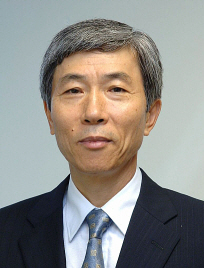 Professor Kang Suk Joong receives 'Korea Engineering Award.'
KAIST”s Professor Kang Suk Joong of the Department of Material Science and Engineering received ‘Korea Engineering Award’ from the Ministry of Education, Science and Technology and Korea Research Foundation. The award is given to those professors who have accomplished world class research and results.
Professor Kang has potentially redirected the direction of research in the field of the microstructure of materials by explaining the fundamental principle behind how the microstructure of a material that affects the physical properties of the polycrystalline structure and changes through processing. Professor Kang applied the results of his findings in the manufacture of new materials and made significant contributions to Korean Material Engineering Industry and was consequently awarded the award.
The ‘Korea Engineering Award’ was thought of in 1994 and a total of 24 recipients were recognized through the award in various fields like electronics, mechanics, chemistry, construction, etc. The recipient is awarded in addition the President’s award and 50million won as prize money.
The ceremony for ‘Korea Engineering Award’ and the ‘Young Scientist Award’ was held in Seoul Press Center Press Club on the 22nd of December at 3pm. The Minister of Education, Science and Technology (Lee Joo Ho), member of Board of Directors of the Korea Research Foundation (Kim Byoung Gook), Director of Korea Science and Technology Archive (Jeong Gil Seng), along with the recipients attended the ceremony.
In addition, Professor Kang was appointed as Distinguished Professor in March 2010 in recognition of his research accomplishments.
2011.01.18 View 11825
Professor Kang Suk Joong receives 'Korea Engineering Award.'
KAIST”s Professor Kang Suk Joong of the Department of Material Science and Engineering received ‘Korea Engineering Award’ from the Ministry of Education, Science and Technology and Korea Research Foundation. The award is given to those professors who have accomplished world class research and results.
Professor Kang has potentially redirected the direction of research in the field of the microstructure of materials by explaining the fundamental principle behind how the microstructure of a material that affects the physical properties of the polycrystalline structure and changes through processing. Professor Kang applied the results of his findings in the manufacture of new materials and made significant contributions to Korean Material Engineering Industry and was consequently awarded the award.
The ‘Korea Engineering Award’ was thought of in 1994 and a total of 24 recipients were recognized through the award in various fields like electronics, mechanics, chemistry, construction, etc. The recipient is awarded in addition the President’s award and 50million won as prize money.
The ceremony for ‘Korea Engineering Award’ and the ‘Young Scientist Award’ was held in Seoul Press Center Press Club on the 22nd of December at 3pm. The Minister of Education, Science and Technology (Lee Joo Ho), member of Board of Directors of the Korea Research Foundation (Kim Byoung Gook), Director of Korea Science and Technology Archive (Jeong Gil Seng), along with the recipients attended the ceremony.
In addition, Professor Kang was appointed as Distinguished Professor in March 2010 in recognition of his research accomplishments.
2011.01.18 View 11825 -
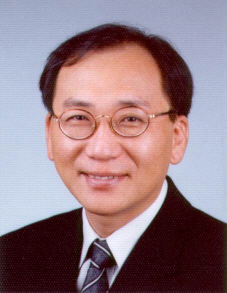 Professor Young-Ho Cho elected as head of international academic conference
KAIST’s Professor Young-Ho Cho of the Department of Bio and Brain Engineering was appointed as the head of the PowerMems (Power Micro Electro Mechanical Systems) symposium to be held at Se-Jong Hotel in Seoul from November 15-18, 2011.
Professor Jo is America’s first engineering doctor in the field of MEMS and is the founding member of the BSAC (Berkeley Sensor and Actuator Center), the start of the MEMS technology.
PowerMEMS is the core of green growth and next generation energy production. It focuses on harvesting energy from minute vibrations or renewable energy sources such as sunlight or plants to harvest and store energy via micro or even nano size systems.
The symposium was first held in 2000, and it is where leading experts in the field share papers on the production and harvesting energy in the micro scale.
2011.01.14 View 11437
Professor Young-Ho Cho elected as head of international academic conference
KAIST’s Professor Young-Ho Cho of the Department of Bio and Brain Engineering was appointed as the head of the PowerMems (Power Micro Electro Mechanical Systems) symposium to be held at Se-Jong Hotel in Seoul from November 15-18, 2011.
Professor Jo is America’s first engineering doctor in the field of MEMS and is the founding member of the BSAC (Berkeley Sensor and Actuator Center), the start of the MEMS technology.
PowerMEMS is the core of green growth and next generation energy production. It focuses on harvesting energy from minute vibrations or renewable energy sources such as sunlight or plants to harvest and store energy via micro or even nano size systems.
The symposium was first held in 2000, and it is where leading experts in the field share papers on the production and harvesting energy in the micro scale.
2011.01.14 View 11437 -
 New drug targeting method for microbial pathogens developed using in silico cell
A ripple effect is expected on the new antibacterial discovery using “in silico” cells
Featured as a journal cover paper of Molecular BioSystems
A research team of Distinguished Professor Sang Yup Lee at KAIST recently constructed an in silico cell of a microbial pathogen that is resistant to antibiotics and developed a new drug targeting method that could effectively disrupt the pathogen"s growth using the in silico cell.
Hyun Uk Kim, a graduate research assistant at the Department of Chemical and Biomolecular Engineering, KAIST, conducted this study as a part of his thesis research, and the study was featured as a journal cover paper in the February issue of Molecular BioSystems this year, published by The Royal Society of Chemistry based in Europe.
It was relatively easy to treat infectious microbes using antibiotics in the past. However, the overdose of antibiotics has caused pathogens to increase their resistance to various antibiotics, and it has become more difficult to cure infectious diseases these days.
A representative microbial pathogen is Acinetobacter baumannaii. Originally isolated from soils and water, this microorganism did not have resistance to antibiotics, and hence it was easy to eradicate them if infected. However, within a decade, this miroorganism has transformed into a dreadful super-bacterium resistant to antibiotics and caused many casualties among the U.S. and French soldiers who were injured from the recent Iraqi war and infected with Acinetobacter baumannaii.
Professor Lee’s group constructed an in silico cell of this A. baumannii by computationally collecting, integrating, and analyzing the biological information of the bacterium, scattered over various databases and literatures, in order to study this organism"s genomic features and system-wide metabolic characteristics. Furthermore, they employed this in silico cell for integrative approaches, including several network analysis and analysis of essential reactions and metabolites, to predict drug targets that effectively disrupt the pathogen"s growth. Final drug targets are the ones that selectively kill pathogens without harming human body.
Here, essential reactions refer to enzymatic reactions required for normal metabolic functioning in organisms, while essential metabolites indicate chemical compounds required in the metabolism for proper functioning, and their removal brings about the effect of simultaneously disrupting their associated enzymes that interact with them.
This study attempted to predict highly reliable drug targets by systematically scanning biological components, including metabolic genes, enzymatic reactions, that constitute an in silico cell in a short period of time.
This research achievement is highly regarded as it, for the first time, systematically scanned essential metabolites for the effective drug targets using the concept of systems biology, and paved the way for a new antibacterial discovery. This study is also expected to contribute to elucidating the infectious mechanism caused by pathogens.
"Although tons of genomic information is poured in at this moment, application research that efficiently converts this preliminary information into actually useful information is still lagged behind. In this regard, this study is meaningful in that medically useful information is generated from the genomic information of Acinetobacter baumannii," says Professor Lee. "In particular, development of this organism"s in silico cell allows generation of new knowledge regarding essential genes and enzymatic reactions under specific conditions," he added.
This study was supported by the Korean Systems Biology Project of the Ministry of Education, Science and Technology, and the patent for the development of in silico cells of microbial pathogens and drug targeting methods has been filed.
[Picture 1 Cells in silico]
[Picture 2 A process of generating drug targets without harming human body while effectively disrupting the growth of a pathogen, after predicting metabolites from in silico cells]
2010.04.05 View 16775
New drug targeting method for microbial pathogens developed using in silico cell
A ripple effect is expected on the new antibacterial discovery using “in silico” cells
Featured as a journal cover paper of Molecular BioSystems
A research team of Distinguished Professor Sang Yup Lee at KAIST recently constructed an in silico cell of a microbial pathogen that is resistant to antibiotics and developed a new drug targeting method that could effectively disrupt the pathogen"s growth using the in silico cell.
Hyun Uk Kim, a graduate research assistant at the Department of Chemical and Biomolecular Engineering, KAIST, conducted this study as a part of his thesis research, and the study was featured as a journal cover paper in the February issue of Molecular BioSystems this year, published by The Royal Society of Chemistry based in Europe.
It was relatively easy to treat infectious microbes using antibiotics in the past. However, the overdose of antibiotics has caused pathogens to increase their resistance to various antibiotics, and it has become more difficult to cure infectious diseases these days.
A representative microbial pathogen is Acinetobacter baumannaii. Originally isolated from soils and water, this microorganism did not have resistance to antibiotics, and hence it was easy to eradicate them if infected. However, within a decade, this miroorganism has transformed into a dreadful super-bacterium resistant to antibiotics and caused many casualties among the U.S. and French soldiers who were injured from the recent Iraqi war and infected with Acinetobacter baumannaii.
Professor Lee’s group constructed an in silico cell of this A. baumannii by computationally collecting, integrating, and analyzing the biological information of the bacterium, scattered over various databases and literatures, in order to study this organism"s genomic features and system-wide metabolic characteristics. Furthermore, they employed this in silico cell for integrative approaches, including several network analysis and analysis of essential reactions and metabolites, to predict drug targets that effectively disrupt the pathogen"s growth. Final drug targets are the ones that selectively kill pathogens without harming human body.
Here, essential reactions refer to enzymatic reactions required for normal metabolic functioning in organisms, while essential metabolites indicate chemical compounds required in the metabolism for proper functioning, and their removal brings about the effect of simultaneously disrupting their associated enzymes that interact with them.
This study attempted to predict highly reliable drug targets by systematically scanning biological components, including metabolic genes, enzymatic reactions, that constitute an in silico cell in a short period of time.
This research achievement is highly regarded as it, for the first time, systematically scanned essential metabolites for the effective drug targets using the concept of systems biology, and paved the way for a new antibacterial discovery. This study is also expected to contribute to elucidating the infectious mechanism caused by pathogens.
"Although tons of genomic information is poured in at this moment, application research that efficiently converts this preliminary information into actually useful information is still lagged behind. In this regard, this study is meaningful in that medically useful information is generated from the genomic information of Acinetobacter baumannii," says Professor Lee. "In particular, development of this organism"s in silico cell allows generation of new knowledge regarding essential genes and enzymatic reactions under specific conditions," he added.
This study was supported by the Korean Systems Biology Project of the Ministry of Education, Science and Technology, and the patent for the development of in silico cells of microbial pathogens and drug targeting methods has been filed.
[Picture 1 Cells in silico]
[Picture 2 A process of generating drug targets without harming human body while effectively disrupting the growth of a pathogen, after predicting metabolites from in silico cells]
2010.04.05 View 16775 -
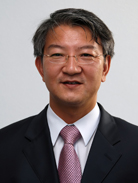 Prof. Sang-Yup Lee Founding Member of Board of Editors of mBop
Prof. Sang-Yup Lee of the Department of Chemical and Biomolecular Engineering at KAIST has been appointed as one of the founding board of editors of the mBio which will be launched next year, the university reported on Friday (Nov. 20).
mBio is the American Society for Microbiology"s first all-online, open access journal which will be launched in next May. According to the mBio website, the journal"s scope "will reflect the enormity of the microbial world, a highly interconnected biosphere where microbes interact with living and non-living matter to produce outcomes that range from symbiosis to pathogenesis, energy acquisition and conversion, climate change, geologic change, food and drug production, and even animal behavioral change."
Prof. Lee, LG Chem Chair Professor, is currently the Dean of the College of Life Science and Bioengineering and director of the Center for Systems and Synthetic Biotechnology. He received his B.S. in Chemical Engineering from Seoul National Univeristy in Korea and his M.S. and Ph.D. in Chemical Engineering from Northwestern University.
As of September 2009, he has published 298 journal papers and has more than 440 patents either registered or applied. Also, he has published 47 books/book chapters, "Systems Biology and Biotechnology of Escherichia Coli" being the latest.
His research interests are systems biology and biotechnology, industrial biotechnology, metabolic engineering, synthetic biology and nanobiotechnology. In particular, he has pioneered systems metabolic engineering, which integrates systems biology with metabolic engineering, for the development of micropoganisms possessing superior properties for industrial applications.
2009.11.20 View 12680
Prof. Sang-Yup Lee Founding Member of Board of Editors of mBop
Prof. Sang-Yup Lee of the Department of Chemical and Biomolecular Engineering at KAIST has been appointed as one of the founding board of editors of the mBio which will be launched next year, the university reported on Friday (Nov. 20).
mBio is the American Society for Microbiology"s first all-online, open access journal which will be launched in next May. According to the mBio website, the journal"s scope "will reflect the enormity of the microbial world, a highly interconnected biosphere where microbes interact with living and non-living matter to produce outcomes that range from symbiosis to pathogenesis, energy acquisition and conversion, climate change, geologic change, food and drug production, and even animal behavioral change."
Prof. Lee, LG Chem Chair Professor, is currently the Dean of the College of Life Science and Bioengineering and director of the Center for Systems and Synthetic Biotechnology. He received his B.S. in Chemical Engineering from Seoul National Univeristy in Korea and his M.S. and Ph.D. in Chemical Engineering from Northwestern University.
As of September 2009, he has published 298 journal papers and has more than 440 patents either registered or applied. Also, he has published 47 books/book chapters, "Systems Biology and Biotechnology of Escherichia Coli" being the latest.
His research interests are systems biology and biotechnology, industrial biotechnology, metabolic engineering, synthetic biology and nanobiotechnology. In particular, he has pioneered systems metabolic engineering, which integrates systems biology with metabolic engineering, for the development of micropoganisms possessing superior properties for industrial applications.
2009.11.20 View 12680 -
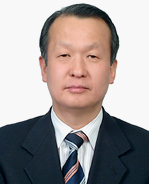 Prof. Yu Wins Sidney Stein International Award
Prof. Jin Yu of the Department of Materials Science and Engineering won the Sidney J. Stein International Award at the plenary session of the International Microelectronics and Packaging Society (IMAPS) held in San Jose, the United States, on Nov. 3.
The Sidney Stein International Award recognizes an individual who is regarded as providing significant international technical and/or leadership contributions to the microelectronics packaging industry, while participating and demonstrating support of IMAPS international activities to enhance the electronics packaging profession.
The International Microelectronics And Packaging Society is the largest society dedicated to the advancement and growth of microelectronics and electronics packaging. It offers chapters around the globe, creating global networks of more than 4,000 members in the United States and an additional 4,000 members throughout Europe and Asia. Prof. Yu currently serves as the chairman of its Asia League Chapter and the Korean Microelectronics and Packaging Society.
2009.11.20 View 12820
Prof. Yu Wins Sidney Stein International Award
Prof. Jin Yu of the Department of Materials Science and Engineering won the Sidney J. Stein International Award at the plenary session of the International Microelectronics and Packaging Society (IMAPS) held in San Jose, the United States, on Nov. 3.
The Sidney Stein International Award recognizes an individual who is regarded as providing significant international technical and/or leadership contributions to the microelectronics packaging industry, while participating and demonstrating support of IMAPS international activities to enhance the electronics packaging profession.
The International Microelectronics And Packaging Society is the largest society dedicated to the advancement and growth of microelectronics and electronics packaging. It offers chapters around the globe, creating global networks of more than 4,000 members in the United States and an additional 4,000 members throughout Europe and Asia. Prof. Yu currently serves as the chairman of its Asia League Chapter and the Korean Microelectronics and Packaging Society.
2009.11.20 View 12820 -
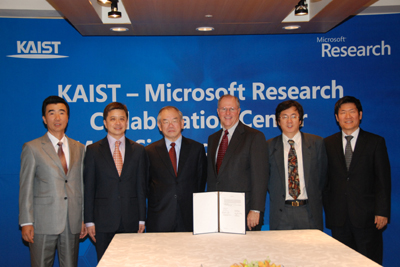 KAIST, Microsoft Research to Set up Research Collaboration Center
KAIST, Korea"s premier institution for science and technology research and education, and Microsoft Research (MSR), the research arm of Microsoft Corp, signed a memorandum of understanding (MOU) to establish a joint research collaboration center in Korea on Oct. 20.
The research collaboration center to be located at the KAIST campus in the Daedeok science and technology town 150 kilometers south of Seoul will be dedicated to promoting joint researches, curriculum innovation, talent fostering and academic exchange in the Asian region.
The MOU signing ceremony at the Westin Chosun Hotel in Seoul was attended by President Nam-Pyo Suh and Vice President Soon-Heung Chang from KAIST, and Craig Mundie, Chief Research and Strategy Officer of Microsoft Corp, and Hsiao-Wuen Hon, Managing Director of MSR Asia from Microsoft.
“We are excited to be working so closely with Microsoft Research,” KAIST President Suh said. “This is the first of many alliances we hope to establish with the world’s industrial leaders that will enable us to resolve some of the toughest problems in computer science and accelerate the next generation of innovation in computing technology and its application in other scientific researches.”
Dr. Hon said: “For over 10 years, Microsoft Research has been committed to working with leading universities throughout Asia to spur computer science research and to strengthen Asia’s knowledge economies by helping foster their capabilities. The Microsoft-KAIST Research Collaboration Center demonstrates our continued efforts to strengthen relations with universities in Korea and build new partnerships with academia here.”
In the last three years, Microsoft Research and KAIST have engaged in close collaboration through research projects, student support programs, and various academic exchange activities. One of the major projects was to construct software development library specifically dedicated to systems biology. A number of excellent students from KAIST participated in the internship program at Microsoft Research in Beijing, China and Redmond, United States.
The establishment of the Microsoft-KAIST research collaboration center will bring the collaborative relations between KAIST and MSR to a new level. The center will provide a platform which unites the innovative minds of KAIST and Microsoft Research to develop technologies that will impact the way people live, learn, work, and play, a KAIST spokesman said.
2008.10.30 View 17464
KAIST, Microsoft Research to Set up Research Collaboration Center
KAIST, Korea"s premier institution for science and technology research and education, and Microsoft Research (MSR), the research arm of Microsoft Corp, signed a memorandum of understanding (MOU) to establish a joint research collaboration center in Korea on Oct. 20.
The research collaboration center to be located at the KAIST campus in the Daedeok science and technology town 150 kilometers south of Seoul will be dedicated to promoting joint researches, curriculum innovation, talent fostering and academic exchange in the Asian region.
The MOU signing ceremony at the Westin Chosun Hotel in Seoul was attended by President Nam-Pyo Suh and Vice President Soon-Heung Chang from KAIST, and Craig Mundie, Chief Research and Strategy Officer of Microsoft Corp, and Hsiao-Wuen Hon, Managing Director of MSR Asia from Microsoft.
“We are excited to be working so closely with Microsoft Research,” KAIST President Suh said. “This is the first of many alliances we hope to establish with the world’s industrial leaders that will enable us to resolve some of the toughest problems in computer science and accelerate the next generation of innovation in computing technology and its application in other scientific researches.”
Dr. Hon said: “For over 10 years, Microsoft Research has been committed to working with leading universities throughout Asia to spur computer science research and to strengthen Asia’s knowledge economies by helping foster their capabilities. The Microsoft-KAIST Research Collaboration Center demonstrates our continued efforts to strengthen relations with universities in Korea and build new partnerships with academia here.”
In the last three years, Microsoft Research and KAIST have engaged in close collaboration through research projects, student support programs, and various academic exchange activities. One of the major projects was to construct software development library specifically dedicated to systems biology. A number of excellent students from KAIST participated in the internship program at Microsoft Research in Beijing, China and Redmond, United States.
The establishment of the Microsoft-KAIST research collaboration center will bring the collaborative relations between KAIST and MSR to a new level. The center will provide a platform which unites the innovative minds of KAIST and Microsoft Research to develop technologies that will impact the way people live, learn, work, and play, a KAIST spokesman said.
2008.10.30 View 17464 -
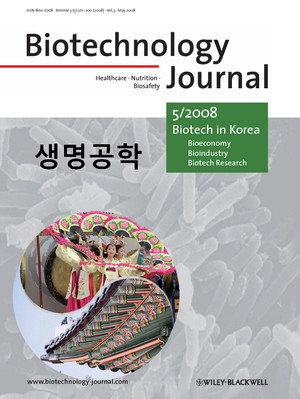 International Science Journal Spotlights Korean Biotechnology
Biotechnology Journal published by German-based Wiley-VCH, one of the world"s major scientific and technical publishers, devoted its entire special edition for May to biotechnology in Korea.
The monthly journal"s special issue was planned by KAIST Professor Sang-Yup Lee of the Chemical and Biomolecular Engineering Department who is one of the journal"s two editors-in-chief.
The special issue outlines the current status and future prospect of biotechnology in Korea, and presents five review papers and eight original papers by leading Korean biotech researchers to showcase recent developments in Korean biotechnology. Among these papers, a review by Dr. Byung-Hwan Hyeon and his colleagues describes in detail the Korean biotechnology strategies represented by "Bio-Vision 2016," and another by Dr. Ji-Hyun Kim and his collaborators presents recent progress in microbial genome projects in Korea.
In the editorial of the journal, Prof. Lee said, "Heavy industry and IT industry have been the two drivers of Korean economic growth. Korea is now considering biotechnology as its next generation growth engine."
Underscoring the growing importance of fusion research, he mentioned that integration of biotechnology with information technology and nanotechnology is advancing rapidly in Korea. Another special edition of Biotechnology Journal focusing on these exciting biotech developments in Korea is planned for the future.
2008.05.20 View 14479
International Science Journal Spotlights Korean Biotechnology
Biotechnology Journal published by German-based Wiley-VCH, one of the world"s major scientific and technical publishers, devoted its entire special edition for May to biotechnology in Korea.
The monthly journal"s special issue was planned by KAIST Professor Sang-Yup Lee of the Chemical and Biomolecular Engineering Department who is one of the journal"s two editors-in-chief.
The special issue outlines the current status and future prospect of biotechnology in Korea, and presents five review papers and eight original papers by leading Korean biotech researchers to showcase recent developments in Korean biotechnology. Among these papers, a review by Dr. Byung-Hwan Hyeon and his colleagues describes in detail the Korean biotechnology strategies represented by "Bio-Vision 2016," and another by Dr. Ji-Hyun Kim and his collaborators presents recent progress in microbial genome projects in Korea.
In the editorial of the journal, Prof. Lee said, "Heavy industry and IT industry have been the two drivers of Korean economic growth. Korea is now considering biotechnology as its next generation growth engine."
Underscoring the growing importance of fusion research, he mentioned that integration of biotechnology with information technology and nanotechnology is advancing rapidly in Korea. Another special edition of Biotechnology Journal focusing on these exciting biotech developments in Korea is planned for the future.
2008.05.20 View 14479 -
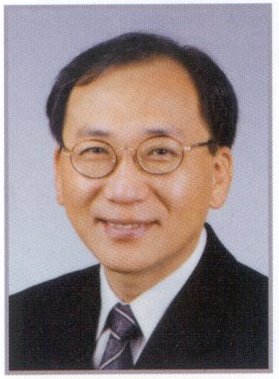 World Micromachine Summit to Open in Daejeon
The 2008 World Micromachine Summit will be held at Hotel Riviera in Daejeon for a four-day run from April 30, drawing worldwide industrial and academic leaders in the micro-nano-technology (MNT).
Organizers say that 76 delegates and 56 observers from 19 countries and regions will take part in this year"s Micromachine Summit. Prof. Cho Young-ho of the Department of Bio & Brain Engineering of KAIST will play host to the annual event.
Participants will discuss the progress of micro-nano-technology in each country and region development of national policies in this area. The Summit was first organized in 1995 by the Micromachine Center of Japan with representatives from 10 countries participating. They were Australia, Canada, Germany, Italy, Japan, the Netherlands, Switzerland, the United Kingdom, and the United States.
Korea was first invited to the conference in 1999. Since then, Korea has played an active role in promoting technological exchanges among nations and has conducted presentations and discussions on major technological breakthroughs.
During the four-day run, each delegation will outline their country"s policies and strategies and present local features on focused areas including this year"s main theme, "Micromachine towards Technology Convergence Era."
The gathering will offer a valuable opportunity for the participants to exchange and collect information on the current state of the MNT, as well as providing a forum for worldwide networking of leaders in the area.
2008.04.29 View 13576
World Micromachine Summit to Open in Daejeon
The 2008 World Micromachine Summit will be held at Hotel Riviera in Daejeon for a four-day run from April 30, drawing worldwide industrial and academic leaders in the micro-nano-technology (MNT).
Organizers say that 76 delegates and 56 observers from 19 countries and regions will take part in this year"s Micromachine Summit. Prof. Cho Young-ho of the Department of Bio & Brain Engineering of KAIST will play host to the annual event.
Participants will discuss the progress of micro-nano-technology in each country and region development of national policies in this area. The Summit was first organized in 1995 by the Micromachine Center of Japan with representatives from 10 countries participating. They were Australia, Canada, Germany, Italy, Japan, the Netherlands, Switzerland, the United Kingdom, and the United States.
Korea was first invited to the conference in 1999. Since then, Korea has played an active role in promoting technological exchanges among nations and has conducted presentations and discussions on major technological breakthroughs.
During the four-day run, each delegation will outline their country"s policies and strategies and present local features on focused areas including this year"s main theme, "Micromachine towards Technology Convergence Era."
The gathering will offer a valuable opportunity for the participants to exchange and collect information on the current state of the MNT, as well as providing a forum for worldwide networking of leaders in the area.
2008.04.29 View 13576